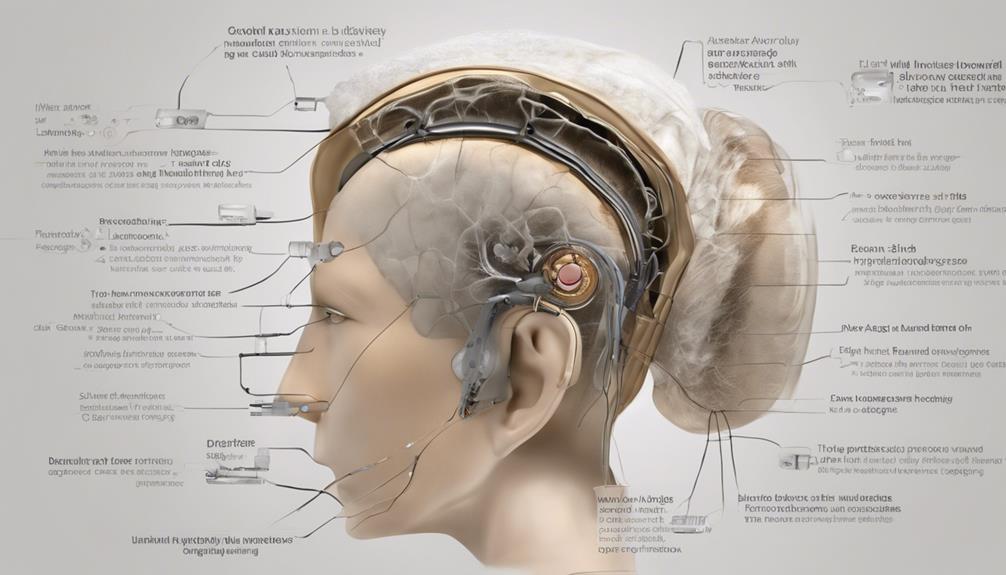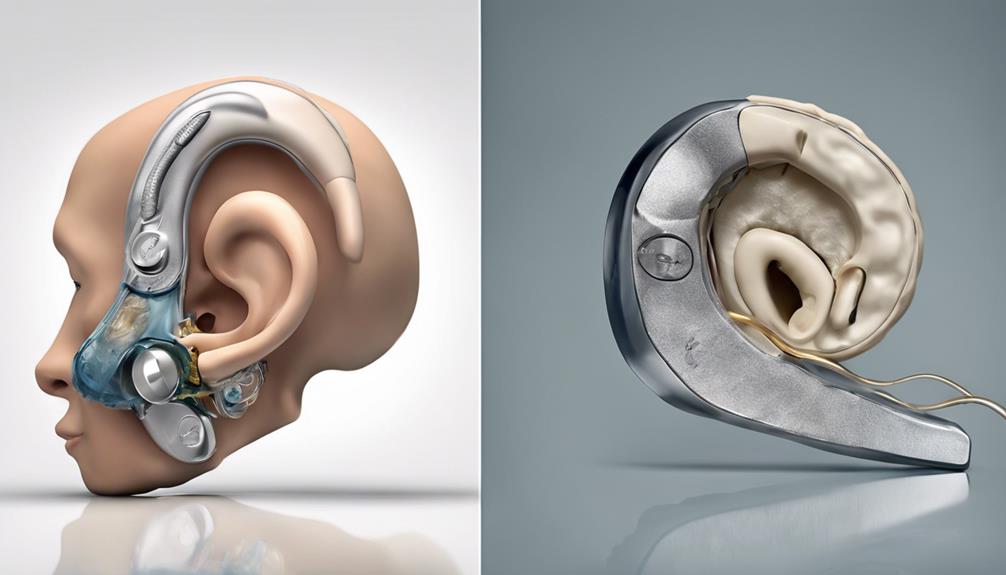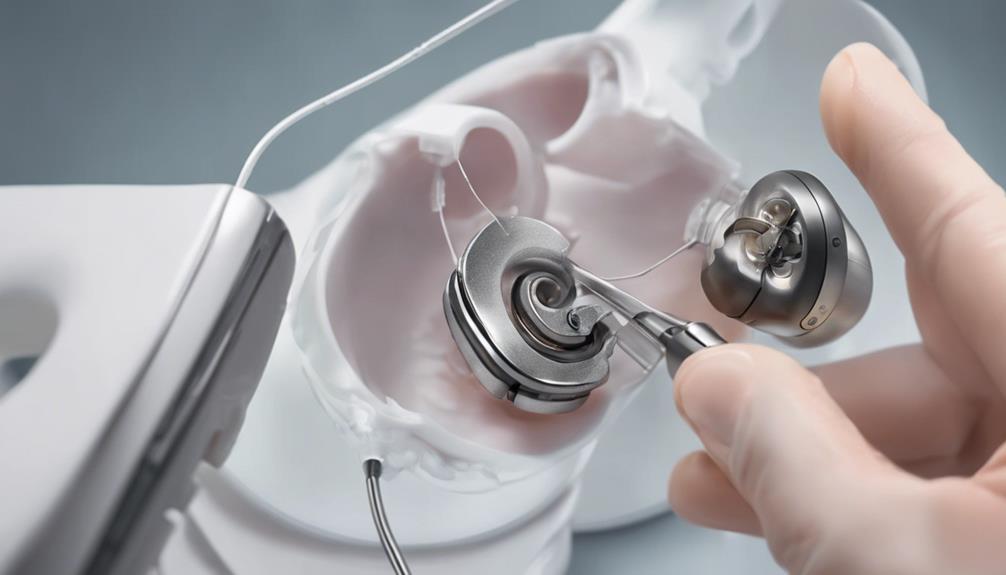Imagine a world where noise fades away into silence, where the sounds of laughter and whispers become distant memories.
Curious about the longevity of cochlear implants?
Join us as we explore the intricate details surrounding the lifespan of these remarkable devices, uncovering essential insights that could shape your journey towards better hearing.
Key Takeaways
- Cochlear implants typically last 10-20 years, with regular upgrades recommended for optimal performance.
- Factors influencing longevity include device model, individual usage, maintenance, and technological advancements.
- Regular maintenance, battery changes, and audiologist checks are essential for prolonged implant lifespan.
- Consider replacement every 5-10 years based on sound quality, technological advancements, and audiologist assessments.
Lifespan of Cochlear Implants
The lifespan of cochlear implants typically ranges from 10 to 20 years, with some exceeding this duration based on individual variables. Cochlear implants consist of both internal and external components. The internal implant is surgically placed under the skin behind the ear, while the external sound processor captures and processes sound from the environment. The external sound processor plays a crucial role in transmitting sound signals to the internal implant. Over time, advancements in technology may necessitate upgrades or replacements of the external sound processor every 3-7 years to ensure optimal performance.
Regular follow-up appointments with audiologists are essential to monitor the functionality of the cochlear implant and address any issues promptly. Maintenance of the implant, including keeping it dry and clean, can also contribute to prolonging its lifespan. Individual factors such as proper care, adherence to usage guidelines, and advancements in technology play significant roles in determining the longevity and effectiveness of cochlear implants.
Factors Affecting Implant Longevity

Factors influencing the longevity of cochlear implants encompass device model variations, individual usage patterns, and maintenance practices. The choice of device model plays a crucial role in determining how long a cochlear implant will last. Modern advancements have led to more durable implants that have a longer lifespan. Individual usage patterns, such as exposure to environmental factors and adherence to care instructions, can impact the longevity of the implant. Additionally, regular maintenance practices, including follow-up appointments with audiologists for adjustments and care, are essential for maximizing the lifespan of cochlear implants. Replacement surgeries may be necessary in cases of device malfunction or changes in hearing needs over time. Monitoring for any hearing changes and addressing them promptly can also contribute to prolonging the lifespan of cochlear implants.
| Factors Influencing Longevity | Description |
|---|---|
| Device Model | Crucial for lifespan |
| Individual Usage | Environmental exposure |
| Maintenance Practices | Follow-up appointments |
| Technology Advancements | Improved durability |
| Replacement Surgeries | For device malfunction |
Maintenance of Cochlear Implants
Regular maintenance practices are essential for ensuring the optimal performance and longevity of cochlear implants. This maintenance includes daily cleaning of external components and regular checks by an audiologist to guarantee proper functioning. While the internal components of cochlear implants are designed to last a lifetime, there may be occasional technology upgrades available for improved performance.
Battery replacement for the external processor is necessary every 5-7 days, depending on usage and battery type, to ensure uninterrupted functionality.
To maintain the longevity of cochlear implants, it's crucial to handle them with care. Proper care and handling not only contribute to the lifespan of the device but also to its effectiveness in restoring hearing. By following recommended maintenance routines and attending scheduled audiologist checks, users can optimize the performance of their cochlear implants and enjoy the benefits of improved hearing for years to come.
When to Consider Implant Replacement

When considering the optimal performance and longevity of cochlear implants, evaluating the need for replacement becomes crucial as external components may require updating every 5-10 years due to wear and tear. Factors such as decreased sound quality, issues with the external processor, or advancements in technology offering improved features are key indicators that it may be time to consider cochlear implant replacement.
Audiologist assessments play a vital role in determining the functionality of your cochlear implant system and recommending replacement when necessary to uphold optimal hearing capabilities. Technological advancements, including enhancements in speech processing, may prompt individuals to upgrade their cochlear implants to benefit from improved performance.
Regular follow-up appointments with healthcare providers are essential to assess the longevity of your cochlear implant and decide on replacement based on individual needs. By staying informed about the latest technologies and seeking professional advice, individuals can ensure their cochlear implants continue to provide enhanced performance for years to come.
Maximizing the Lifespan of Implants

How can individuals enhance the longevity of their cochlear implants through proper care and maintenance practices?
To maximize the lifespan of cochlear implants, it's crucial to follow specific maintenance routines and care guidelines. Here are some key practices to help extend the durability of your cochlear implants:
- Regular Maintenance: Schedule and attend follow-up appointments with your audiologist to monitor the functionality and longevity of your cochlear implants.
- Technology Advancements: Stay informed about the latest technological advancements in cochlear implant technology that can improve the lifespan and performance of your implants.
- Handling and Cleaning: Properly handle and clean your cochlear implants according to the manufacturer's instructions to prevent damage and ensure longevity.
- Moisture Exposure Prevention: Avoid exposing your cochlear implants to excessive moisture, as it can damage the internal components and reduce their lifespan.
- Internal Component Care: Be mindful of protecting the delicate internal components, such as electrodes, to ensure the long-term durability of your cochlear implants.
Frequently Asked Questions
How Many Years Do Cochlear Implants Last?
Cochlear implants typically last between 10 to 20 years, with some lasting beyond that mark. Factors such as maintenance, technological advancements, and usage patterns influence their lifespan. Newer implant technologies may offer improved longevity.
Regular check-ups with an audiologist help ensure the device's health. Stay informed about advancements in the field to make the most of this life-changing technology.
What Is the 60 60 Rule for Cochlear Implants?
We can explain the 60 60 Rule for cochlear implants as a guideline indicating that 60% of users typically experience significant hearing benefits, with another 60% reporting improved speech understanding. This principle extends to pediatric and adult recipients, with around 60% of children achieving age-appropriate language outcomes and adults showcasing enhanced speech perception and communication skills post-implantation.
It serves as a general framework to anticipate positive outcomes in hearing and speech for cochlear implant users.
What Is the Critical Period for Cochlear Implants?
We know that the critical period for cochlear implants typically falls within the first 3 to 5 years post-implantation. During this time, our brains are most receptive to adjusting and interpreting signals from the implant.
This period is crucial for maximizing the benefits of cochlear implants, especially for children implanted at a young age. Adults can also see improvements in speech understanding and sound perception during this critical window.
How Often Do Cochlear Implants Need to Be Mapped?
When it comes to mapping cochlear implants, regular sessions are crucial for optimal performance. We recommend frequent adjustments during the first year post-implantation to fine-tune settings.
After this initial period, mapping sessions typically occur every 6-12 months to address any changes in hearing abilities or lifestyle factors. Our team of audiologists, skilled in cochlear implant programming, work tirelessly to customize settings for improved speech understanding.
Conclusion
In conclusion, the lifespan of cochlear implants can vary depending on individual factors and advancements in technology.
It's important to regularly maintain and monitor your implant to maximize its longevity.
Remember, like a well-oiled machine, proper care and attention can help your cochlear implant continue to bring the gift of sound into your life for years to come.











